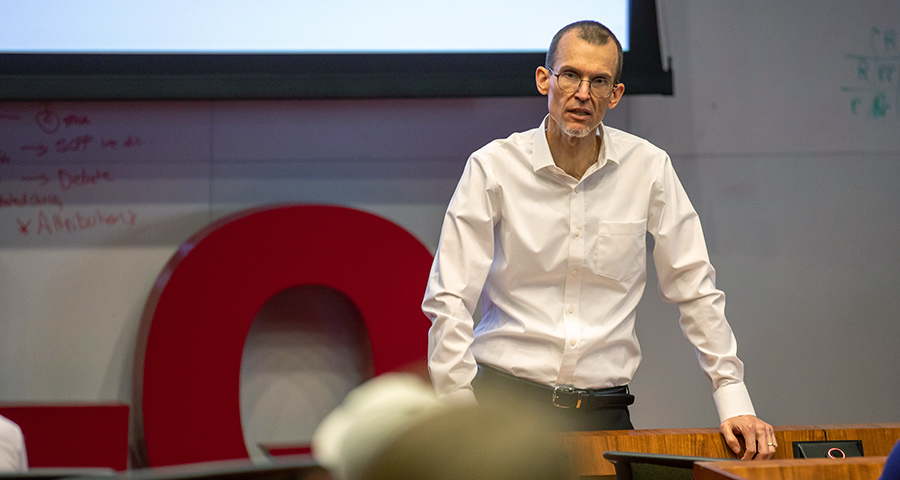
Opportunities for language education in a (post) pandemic world
In Gulf-Times, August 4, 2020
Dudley Reynolds, co-area head of arts and sciences and teaching professor of English at Carnegie Mellon University in Qatar, a Qatar Foundation partner university, on why students need to be allowed to experience how multilingualism makes a place richer.
I believe that schools should do more than pass along the past; they should lay the foundation for a better future. They should try to make the community they serve a smarter, fairer, and more welcoming place.
The past year has made us all very aware of the dangers and injustices of a divided world. During the Covid-19 pandemic, we have seen how inequities in health care, living conditions, and economic security mean that some people fare better than others. We have also realized how none of us will be healthier than the least healthy among us.
We must begin to dismantle the barriers within our communities that lead to economic disparities, and also those that cause us to see the person beside us as a “worker,” a “citizen,” an “Arab,” or a “Black person” before we see them as a human being. Jobs, nationalities, and races should never be ignored – they are important parts of who we are. But we must realize that all jobs, all nationalities, and all races contribute to the well-being of our world. How can we teach this?
Last year I authored a report on Language Policy in Globalized Contexts for the World Innovation Summit for Education (WISE), Qatar Foundation’s global education initiative. I argued that if schools want to improve their communities and begin dismantling social barriers, they need to rethink how they use and teach languages. They should challenge the perception that some languages are more valuable than others.
Too often, languages spoken at home are not used in school. A United Nations report estimates that as many as 40% of students worldwide have to study in a language they do not fully understand. In addition to making learning difficult, this result of a policy decision tells them their home language is not good enough for school. It makes them question whether they are part of a community.
Moreover, when teaching Arabic or English or Malayalam, we often focus on one language at a time and forbid all others. This suggests that what we know about one language is not helpful when learning another language, that languages somehow compete for mental space. It also presents a false picture of how languages are spoken in the world outside the classroom.
Go into any shop in Qatar and you will hear multiple languages being spoken, often by the same individual as part of a single conversation. Skilled users of language can easily go between multiple languages. They recognize connections and use what they know in one language to help them with another. They have a deep understanding of how all languages work as a medium for informing, persuading, and entertaining.
Seeing how social divisions have exacerbated the impact of Covid-19, I realize even more the imperative of valuing and supporting what each student thinks of as “their” languages, of including in school curricula multiple opportunities to learn additional languages that increase economic opportunities and open up different ways of seeing the world. Students need to feel valued by their community; they need to value people who are different from them. They need the mental exercise that comes with making connections between languages. They need to leave behind fears of languages they do not understand and experience first-hand how multilingualism makes a place richer.
The changes that I am asking for are more than token acknowledgment of diversity. As detailed in the report, they involve changes to how we structure curricula, the financial support we provide for learning inside – as well as outside – schools, the power we give teachers to design instruction for their individual students, and even what we teach as language knowledge.
While working on the report, I had the chance to observe specialists from Qatar Foundation’s Education Development Institute working with schools from Qatar Foundation’s Pre-University Education to implement such changes. They started by asking school leaders about their own experiences hearing and learning languages and what they could do to value the experiences of each of their students. Real, practical changes that can be implemented at the level of individual schools begin with crafting a broad, shared vision for how each individual should feel as part of a community.
As we emerge from an isolated and divided pandemic world, I hope we will envision the opportunities education systems worldwide provide to promote languages and multilingualism as vehicles for collaboration and community building.
*Dudley Reynolds is co-area head of arts and sciences and teaching professor of English at Carnegie Mellon University in Qatar. In 2016-2017, he served as president of TESOL International Association, the world’s largest professional association for teachers of English to speakers of other languages. He has been a teacher and researcher of multilingual language learners for more than 30 years. In addition to language education policy, his research addresses developmental patterns in additional language learning, curricular and pedagogical approaches to literacy development, teacher education and learning.
